Hello
Premium Members,
California has been taking advantage of online bidding for several
years now. One of the first prominent companies responsible for
Internet auctions of county-foreclosed properties is Bid4Assets.
Whenever
I am looking for the latest online sales, I always check and see what
is listed on their site. To make things even easier, I am on an email
list so I usually when sales are coming up.
Bid4Assets
offers a few different services. In addition to helping counties sell
foreclosed properties, they also will list your properties for sale
with a fee of course, much like Ebay.
Here is the link to Bid4Assets: http://www.bid4assets.com.
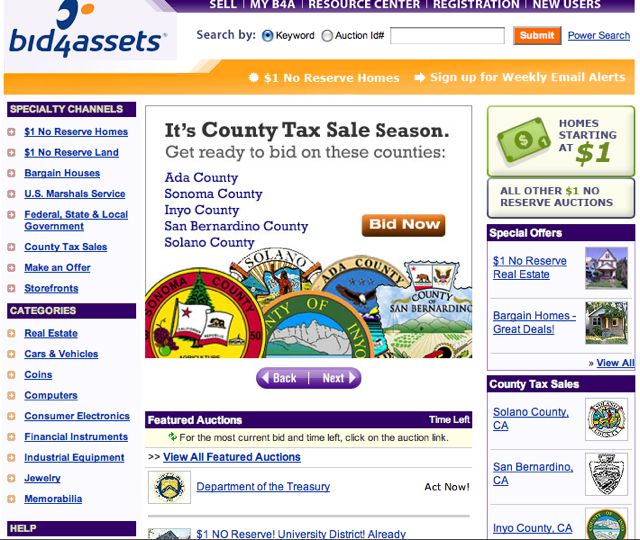
As you can see from the website, tax sales are in full bloom in California. The following sales are coming up:
- San Bernardino: August 7 - 9, 2010. You must register by August 3, 2010 at 4:00 PM Eastern Time
- Inyo: August 14 - 16, 2010. You must register by August 14 - 16, 2010 at 4:00 PM ET
- Ada: August 21 - 24, 2010. You must register by August 17, 2010 at 4:00 PM ET
- Sonoma: August 21 - 24, 2010. You must register by August 17, 2010 at 4:00 PM ET
Start by setting up an account and registering with Bid4Assets
http://www.bid4assets.com/help/index.cfm?fuseAction=howToParticipate
The following are necessary steps to participate in the Tax Deed Sale:
1. Registration - usually 7 days in advance.
2. Property Research - done online or at the County.
3. Place BidDeposit - For San Bernardino, a $1000 Deposit is required.
4. Bidding - online
5. Auction Ends - as shown.
This is all explained very well on the Bid4Asset's website.
http://www.bid4assets.com/help/index.cfm?fuseAction=howToParticipate
California and San Bernardino
First, let's look at San Bernardino, but remember you must sign up by
tomorrow (August 3rd) if you want to participate. The Sonoma sale is
also coming up and you have until August 17th to register.
San
Bernardino is the largest county in the United States. In fact, in area
(about 20,000 square miles) it is larger than nine U.S. states. There
are about 2 million people that live within the county limits as well.
The point here is that San Bernardino County is like investing in an
entire State and they typically have at least two sales per year.
Tip:
At past sales in San Bernardino, the best deals seemed to be on the
outskirts of the cities, in rural areas. This makes sense because
bidders have a harder time doing research on these properties.
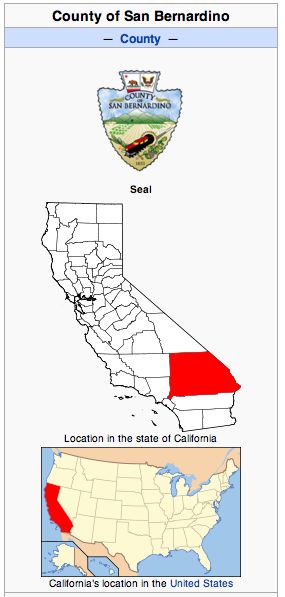
What you need to know about California Tax Deed Sales
California
is authorized to sell tax lien certificates (18%), but no sales have
been conducted. At least one county has considered having a tax lien
sale. Instead, California uses the tax deed process. State law refers to their process as Tax-Defaulted Land Sales.
After
five years of tax-defaulted status, defaulted properties become subject
to the "Power to Sell." These properties may be sold at future
auctions, unless redeemed for the full taxes, penalties, and other
associated costs.
Unfortunately, state law does not allow for
an over-the-counter process so you cannot buy tax-defaulted properties
through the mail. California has been on the leading edge of Internet
auctions and Bid4Assets seems to be the vendor of choice for many
counties.
In California, the deed is not clear for at least
one year due to California’s one-year legal challenge period. The legal
challenge period is a safeguard for homeowners in case the sale was not
conducted properly or all owners were not notified. Of course, this is
not an easy process for someone who wishes to challenge a sale; in
face, it must be done through the courts. In the event of a successful
legal challenge, the investor has to be compensated for what she paid,
but improvements may not be reimbursed.
During this one-year
challenge period you are still the owner and you have rights of
occupancy, rental, even sales through a contract for deed. However, you
will not be able to get a free and clear title until this period is
over and you quiet the title. Most title insurance companies will not
issue a title policy until after the one-year challenge period has
ended.
By the way, quieting a title is a legal process that
involves title research and generally using the court to issue notice
to any potential lien holder, person or entity that may have a right to
the property. Typically, the court issues public notice and if no one
responds, then they loose their rights to the property. After the
process is finished, the deed has more warranties or guarantees for its
owner.
The legal challenge period is not a
right-of-redemption period, so please don’t confuse that with the
right-of-redemption process that occurs in some other tax deed states
like Texas and Georgia.
Tax-defaulted sales occur year round
and according to state law each county must conduct a sale at least
once every four years. State law dictates that the minimum bid for
property offered at a public auction tax sale be an amount not less
than the total amount necessary to redeem the tax default, plus cost.
An exception is when property interests have been offered at a previous
sale and no acceptable bids were received. Pursuant to Section
3698.5(c) of the California Revenue and Taxation Code, the Tax
Collector may offer that property or property interest at a minimum bid
that is less than the amount of the tax default, plus cost.
California
conducts a great number of tax deed sales, with more than 10,000
individual parcels sold every year. California is an above average tax
deed state. In most cases you will need substantial capital to bid on
properties since property values are so high. Be careful not to overbid
on properties at highly competitive auctions. Do your research, stick
to a number that provides safety and don’t budge.
I am not
comfortable paying more than 75% of the true market value and my goal
is 50%. That provides me with a nice safety factor and a good deal.
During the early to mid 2000s, especially 2005 through 2007, real
estate values skyrocketed in many locations in California.
Consequently, bidding at tax deed sales would sometimes exceed market
value (i.e., over 100% of value). In the last two years, reason has
prevailed, but I cannot guarantee sale because of the sheer number of
people living in and wanting to live in California.
What else should you know about Investing in California?
Mello Roos
Community
Facilities District Act (more commonly known as Mello-Roos) was a law
enacted by the California State Legislature in 1982.[1]. A Mello-Roos
District is an area where a special property tax on real estate, in
addition to the normal property tax, is imposed on those real property
owners within a Community Facilities District. These districts seek
public financing through the sale of bonds for the purpose of financing
public improvements and services.[2] These services may include
streets, water, sewage and drainage, electricity, infrastructure,
schools, parks and police protection to newly developing areas. The tax
paid is used to make the payments of principal and interest on the
bonds (http://en.wikipedia.org/wiki/Mello-Roos).
I mention this because it is a public tax and may not be extinguished through the tax sale process.
Proposition 13
Proposition 13 (officially titled the People's Initiative to Limit
Property Taxation) was an amendment of the Constitution of California
enacted in 1978, by means of the initiative process. The proposition
lowered property taxes by rolling back property values to their 1975
value and restricted annual increases in assessed value of real
property to an inflation factor, not to exceed 2% per year. It also
prohibited reassessment of a new base year value except upon (a) change
in ownership or (b) completion of new construction
(http://en.wikipedia.org/wiki/California_Proposition_13_(1978)).
This
is important to know because when you are checking property values, the
value may be artificially low; however, when you takeover as a new
owner the tax can be reassesed and you end up at a higher tax rate than
you thought.
1915 Improvement Bond
This
is a special assessment for improvement of streets, curbs, gutters,
sewers and basic infrastructure. It is a goverment lien and holds
priority over mortgages or other private liens. When doing your
research, please check for any bonds. Like Mello Roos, a special
assessment may not be extinquished.
Dissenting Tax Jurisdiction
Any city or taxing jurisdiction may dissent to a sale and therefore their taxes may not be extinquished.
Federal IRS Liens
This
is always a subject that engenders a lot of interest. Internal Revenue
Service (IRS) liens are not necessarily extinguished through the tax
foreclosure process. However, what you should know is this:
- The county should have performed a title search and notified all lien holders before the sale.
- The IRS may decide the equity is not worth going after.
- The IRS has 120 days to decide from the point of notification.
- If
you find out a your newly acquired property has a federal tax lien, it
may best to wait 120 days before notifying the IRS to obtain a release.
- This is complicated and the best option is to do your research and if a federal tax lien shows up, move on to the next property.
How to screen and sort using a spreadsheet list
Visit this link and download the Excel spreadsheet:
http://www.bid4assets.com/storefront/?sfid=536
Load the spreadsheet in Excel, Open Office or another spreadsheet program.
Select
the range of data, which run from rows 1 through 368 and perform a
series of sorts. I like to sort in desending order based upon total
value and also improvements.
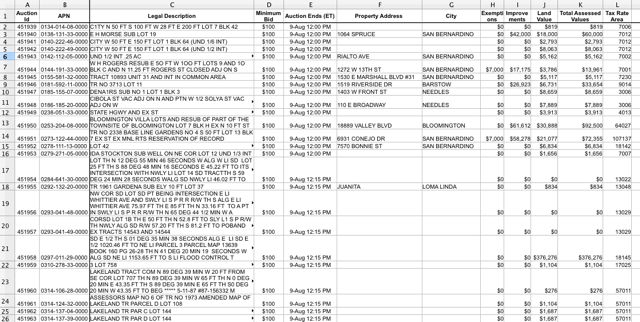
Try this and see what you come up with.
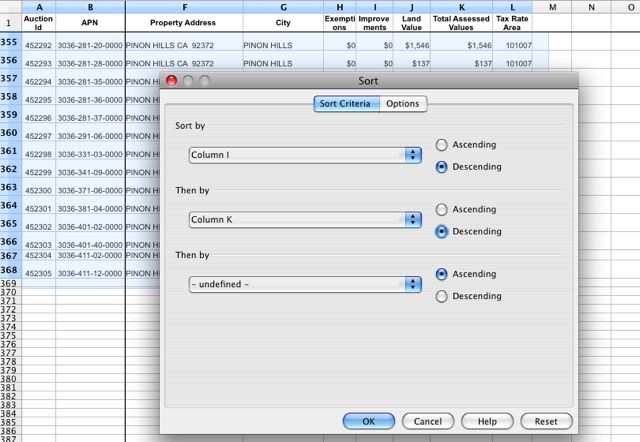
After selecting the range and sorting, this is what you should come up with.
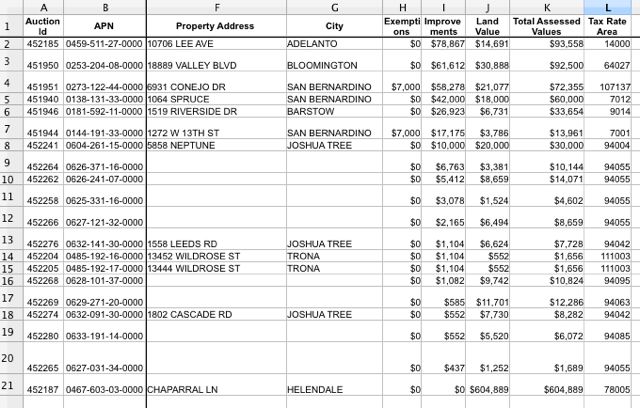
Now use the Bid4Assets search feature and enter the APN number and start doing your research.
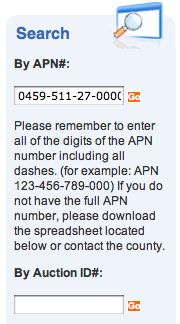
You can also use the APN number directly on the County website.
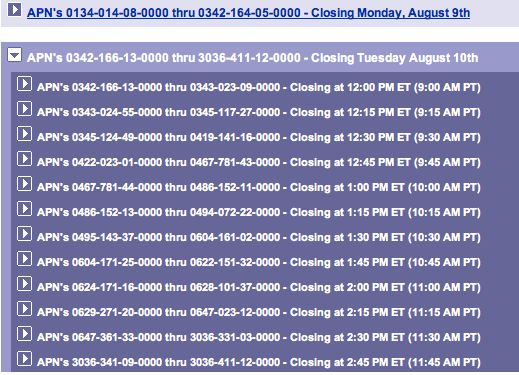
The San Bernardino site is located at MyTaxCollector.com.
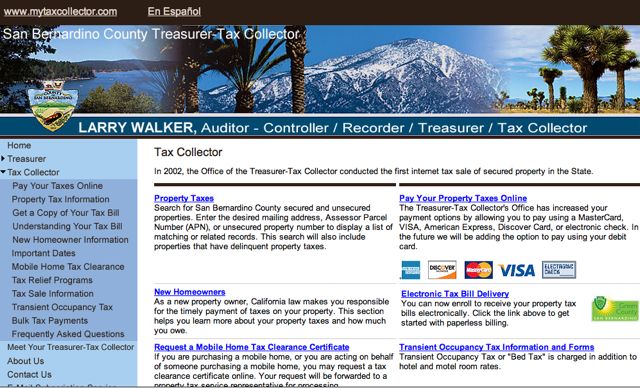
Be sure to check for redemptions and delete those from your
spreadsheet. The redemptions are listed on the Bid4Asset's website.
This is very important because you don't want to do research on a
property that has redeemed.
Knowing
how to sort data is crucial. This one concept can save you a lot of
time and frustration. I know it is a little computer "geeky," but so
what...it really helps. If you encounter that has thousands of liens,
like I have seen in Arizona or Florida, you will really want to take
advantage of anything that speeds up the process of screening.
Once
you have the list paired down to a manageable level, then you can take
the APN numbers and look up additional information as shown above. In
other cases, you will want to take your screened list, say the top 10,
and run the property numbers through the three most important websites:
1. The Tax Collector
2. The Appraiser
3. The Clerk/Recorder
Questions:
In
researching APN 0626-241-07-0000, the ownership showed two people and a
business. How is that possible? What does Tenancy in Common mean?
Research
APN 0253-204-08-0000 and determine if it is vacant land or has a
house/building. Did you find the Google Street View link?
Find
the Recorder's office and do a grantor/grantee search on the property
owners of APN 0273-122-44-0000. Could you find the notice given by the
County for tax delinquency and notice to sell? Hint...use this link
http://www.sbcounty.gov/acr/RecSearch.htm and click on the
Grantor/Grantee index. You will use the property owner's name. If there
are two owners, search both names.
Very best,
Michael